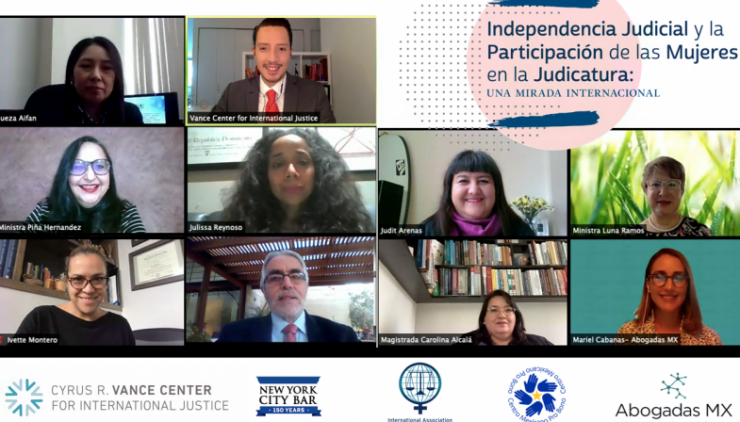This website uses cookies so that we can provide you with the best user experience possible. Cookie information is stored in your browser and performs functions such as recognising you when you return to our website and helping our team to understand which sections of the website you find most interesting and useful.
Vance Center Supports Judicial Independence and Gender Equality in Mexico
September 2020
As part of the Vance Center’s efforts to advance judicial independence in the region and in particular the work of Mexican women judges, the Vance Center organized a virtual conference “Judicial Independence and Gender Equality in the Judiciary: an International Perspective”, in partnership with the International Association of Women Judges, Pro Bono Network of the Americas member Centro Mexicano Pro Bono, and Abogadas MX, the national chapter of the Women in the Profession Program.
The conference focused on a multi-jurisdictional survey and research project, conducted by the Vance Center, comparing issues of judicial independence and gender equality in the judiciary, including the selection of judges and their terms in office, case assignment systems, court assignment and career advancement, compensation and benefits, safety and protection, reporting of grievances and ethical violations, and freedom of expression. Covering Argentina, Brazil, Chile, Colombia, Mexico, Spain, and the United States, the study also addressed the legal provisions for gender equality in the judiciary, including regulations or policies to address institutional barriers to women’s career advancement.
The virtual event included approximately 200 participants and featured prominent panelists: Vice President of the International Association of Women Judges Hon. Margarita Luna Ramos; Justice of the Mexican Supreme Court of Justice Hon. Norma Lucía Piña Hernández; United Nations Special Rapporteur on Independence of Judges and Lawyers Dr. Diego García Sayán (via pre-recorded video), Guatemala High-Risk Tribunal Judge Erika Aifán; former U.S. Ambassador to Uruguay and Winston & Strawn partner Julissa Reynoso, and APCO Worldwide Senior Director Judit Arenas.
Centro Mexicano Pro Bono executive director Ivette Montero, president of the board of Abogadas MX Mariel Cabañas, and Jaime Chavez Alor introduced the event. Hon. Carolina Isabel Alcalá Valenzuela, liaison with the Mexican judges, moderated the event.
Hon. Margarita Luna Ramos and Hon. Norma Lucía Piña Hernández focused their remarks on gender equality in the judiciary, including current efforts and challenges. Dr. Diego García-Sayán underscored the importance of United Nations and other international standards, referring to the 35th anniversary of the Basic Principles on the Independence of the Judiciary, the Inter-American Convention on the Prevention, Punishment, and Eradication of Violence against Women, the United Nations Convention against Corruption, and the Bangalore Principles of Judicial Conduct. Judge Erika Aifan spoke about her experience as a women judge facing attacks to judicial independence in Guatemala and the gender discrimination present in the judiciary. Ambassador Reynoso spoke about the importance of judicial independence and Justice Ruth Bader Ginsburg’s legacy as a leader among woman judges. Arenas connected the strengthening of judicial independence to the UN 2030 Agenda.
Participants emphasized the importance of the publication as a tool to pursue efforts to strenghthen judicial independence and develop policies to promote gender equality in the judiciary. Most participants mentioned the importance of the legal community at large being involved in supporting the judiciary.
The Vance Center in October 2020 will conduct online brainstorming sessions to identify projects for ongoing engagement with Mexican judges, particularly at the state level, focusing on rules for appointing judges, assigning them cases, and regulating their judicial conduct, from the perspective of seeking gender equity and judicial independence. More information here.


